- Market-Inspector.co.uk
- b2b content marketing strategies
10 B2B Content Marketing Strategies For Your Business

Content marketing is a critical component of B2B marketing strategies, providing a means to build brand awareness, generate leads, and drive sales. Here, we delve into key strategies for effective B2B content marketing, supported by statistics, facts, and examples.
What is B2B content marketing?
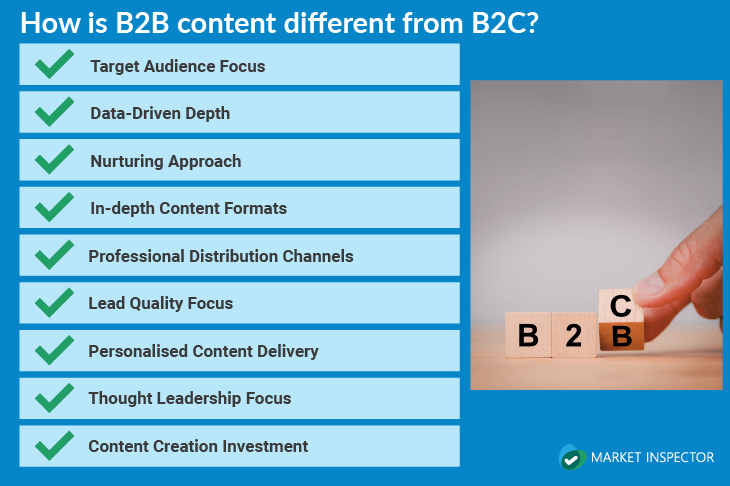
B2B content marketing is a strategic approach to creating and distributing valuable, relevant content to attract and engage a business audience.
Here is how B2B content is different from B2C content:
- Target audience: B2B marketing targets decision-makers within businesses, often involving multiple stakeholders in the purchasing process. This requires a more focused and tailored approach to address each decision-maker's needs and pain points.
- Content complexity: B2B content is often more detailed, technical, and data-driven, focusing on providing in-depth information and demonstrating ROI.
- Sales cycle: The B2B sales cycle is more prolonged (typically 84 days compared to several minutes for B2C) and more complex, involving multiple touchpoints and a thorough decision-making process.
- Content types: B2B content uses in-depth resources like whitepapers, case studies, webinars, and industry reports.
- Distribution channels: B2B primarily uses LinkedIn (around 84% of B2B marketers), email, and industry publications to reach a professional audience. Optimising content for social media platforms like LinkedIn and Twitter to engage professional audiences effectively is essential.
- Metrics: B2B focuses on lead quality, sales-qualified leads (SQL), and customer lifetime value rather than social media engagement, brand awareness, or immediate sales in B2C.
- Content goals: B2B content aims to educate, build credibility, and demonstrate expertise rather than entertaining and creating emotional connections, which is inherent in B2C business.
- Budget allocation: B2B emphasises less paid advertising and influencer partnerships and instead invests more in content creation and thought leadership. For example, Microsoft invests heavily in producing high-quality whitepapers and research reports to establish thought leadership.
- Personalisation: B2B uses account-based marketing and tailoring content to specific industries or roles. Personalised content produces a 20% increase in sales opportunities.
Personalisation in Account-Based Marketing (ABM) is crucial for fostering deeper relationships with high-value clients by tailoring content to meet their specific needs. Personalisation helps capture target accounts' attention by addressing their unique pain points and interests. This approach leads to more meaningful interactions and higher engagement rates.
Leveraging first-party data is essential for understanding the specific needs and behaviours of target accounts. This data-driven approach allows for creating highly personalised experiences that resonate with individual accounts.
Why is B2B content strategy important?
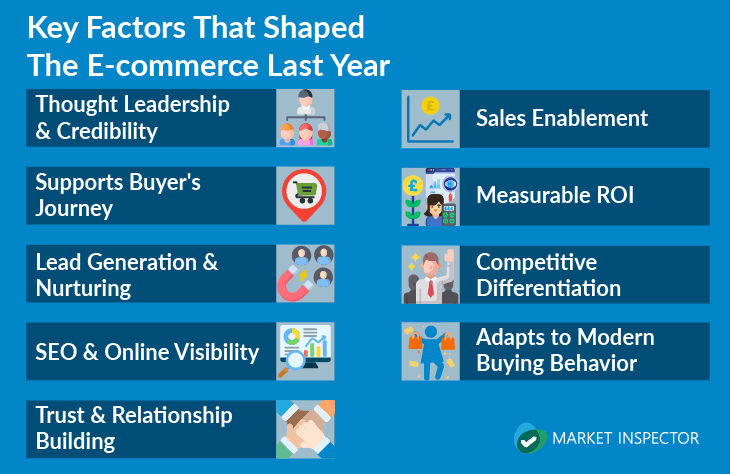
A strategic approach to content marketing enables B2B companies to attract, engage, and convert their target audience more effectively and efficiently than traditional marketing methods.
It's essential for building brand awareness, generating quality leads, and ultimately driving business growth in the competitive B2B landscape.
Here are several reasons why a strategy is vital for effective B2B marketing:
- Establishes thought leadership and credibility: High-quality content demonstrates expertise and positions the company as an industry leader. 84% of B2B marketers say content marketing has helped increase brand awareness.
- Supports the buyer's journey: On average, B2B buyers consume 3-5 pieces of content before engaging with a salesperson. Content educates prospects at each stage, from awareness to consideration to decision.
- Generates and nurtures leads: Content marketing generates 3x as many leads as traditional marketing, costing 62% less. Valuable content attracts potential customers and keeps them engaged throughout long B2B sales cycles.
- Improves SEO and online visibility: Quality content helps improve search engine rankings and drive organic traffic. 84% of B2B buyers start purchasing with a referral or online search.
- Builds trust and relationships: Consistently providing helpful content builds trust with prospects over time. 80% of business decision-makers prefer to get company information from articles over ads.
- Supports sales efforts: Content is a sales enablement tool that helps sales teams convert leads. 51% of B2B marketers say content marketing has increased sales.
- Provides measurable ROI: Content marketing efforts can be tracked and measured to demonstrate value. This allows for the optimisation of strategies based on performance data.
- Differentiates from competitors: Unique, high-value content helps a company stand out in a crowded B2B marketplace.
- Adapts to modern B2B buying behaviour: Aligns with self-directed research processes of today's B2B buyers. Allows companies to engage prospects earlier in their decision-making process.
Most effective B2B content marketing strategies
1. A comprehensive content marketing strategy
-
- Provides clear direction for content creation and distribution
-
- Ensures consistency across different channels and content types
-
- Enables better measurement and optimisation of efforts
A comprehensive content marketing strategy is essential for B2B companies aiming to build brand awareness, engage their target audience, and drive conversions.
This strategy involves a well-planned approach to creating, distributing, and measuring content that aligns with business goals and addresses the target audience's needs.
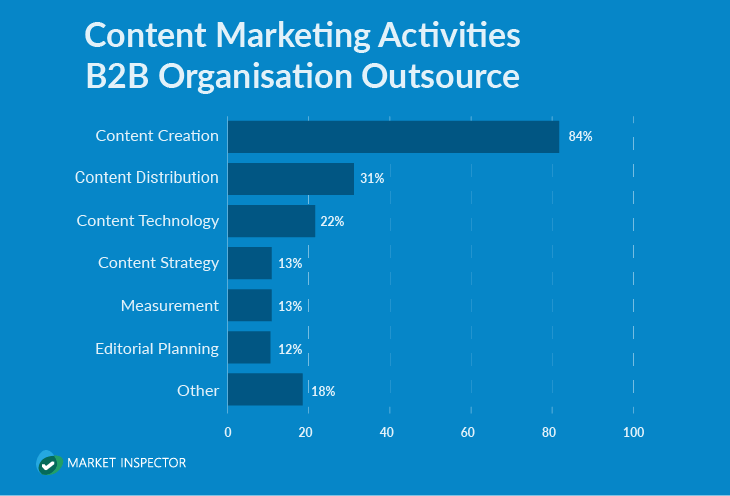
Elements of a B2B content marketing strategy
-
Audience research
Understanding the target audience is crucial for creating relevant and engaging content. Detailed audience research helps identify different buyer personas' needs, preferences, and pain points. -
Content planning and creation
A comprehensive strategy includes a content calendar that outlines what, when, and where content will be published. This ensures consistency and alignment with business goals. -
SEO and keyword research
Optimising content for search engines helps increase visibility and attract organic traffic. Strategic keyword research is essential for identifying relevant terms and phrases that the target audience is searching for. -
Content distribution
Effective distribution ensures that content reaches the right audience through the proper channels. This includes social media, email marketing, and partnerships with industry influencers. -
Performance measurement
Tracking key metrics, such as website traffic, engagement rates, and lead conversions, helps measure the content strategy's success. This data can be used to optimise future content efforts.
With a significant number of decision-makers preferring to gather information from articles rather than ads, creating optimised content for social media platforms is essential. This includes leveraging platforms like LinkedIn, Twitter, and even Instagram for professional engagement.
2. High-quality, educational content
- Helps establish authority in your niche
- Addresses customer pain points directly
- Supports the buyer’s journey at various stages
Educational content positions brands as thought leaders and trusted resources in their industry. 77% of B2B marketers use it in their content marketing strategy.
You build credibility and trust by providing valuable insights and solutions to your audience's pain points. These can be whitepapers, ebooks, case studies, blog posts, how-to guides and tutorials, templates and tools, ROI calculators, or industry reports.
Emphasise the role of storytelling in building brand identity and establishing trust with the audience by creating emotionally resonant content.
HubSpot's comprehensive resources, including blog posts, ebooks, and courses, have established it as a go-to source for marketing and sales education. Its content strategy has contributed to its growth from a startup to a publicly traded company with over 100,000 customers.
- Comprehensive blog: Covers a wide range of marketing, sales, and customer service topics.
- HubSpot Academy: Offers free online courses and certifications.
- Ebooks and guides: Provides in-depth resources on various aspects of inbound marketing.
- Templates and tools: Offers free, practical resources like email templates and social media calendars.
- Research reports: Publishes original research on industry trends and best practices.
Use AI to gather and analyse data on trending topics and industry news to keep your educational content relevant.
AI tools can generate first drafts of content, such as blog posts, articles, and reports, quickly and efficiently. This automation allows content teams to focus more on strategy and creativity rather than the initial drafting process. Tools like WriteSonic and Jasper are examples of AI writing assistants that can produce high-quality content at scale.
Also, AI can tailor content to meet the specific needs of different buyer personas, enhancing engagement and conversion rates by understanding user behaviour.
It can also suggest improvements in structure and readability, ensuring that the content not only ranks well but is also engaging for the target audience. AI-powered analytics can help identify top-performing content types and topics, guiding future content creation efforts.
3. Short-form video content
- Increases engagement and time spent on site
- Can be repurposed across multiple platforms
- Appeals to different learning styles
Short-form videos are becoming increasingly popular in B2B marketing. These videos effectively capture attention and convey messages succinctly, catering to the fast-paced consumption habits of today's audiences.
Short-form videos are more likely to be shared across social media platforms, increasing brand visibility and awareness. This format is particularly effective on platforms like TikTok, Instagram Reels, and YouTube Shorts, where users prefer quick, digestible content.
Short videos allow B2B marketers to deliver compelling messages quickly, making them ideal for engaging professional audiences who may not have time for longer content.
Use AI to create short summaries or highlight reels of longer videos to engage viewers with limited time and dynamically adjust video content in real time based on viewer engagement and feedback. Tools like Synthesia can generate AI-powered explainer videos and product demos with realistic avatars.
Salesforce's "Everyday Heroes" video series showcases customer success stories, effectively combining storytelling with product promotion. This type of content helps potential customers visualise how Salesforce's tools can be applied to their own business processes:
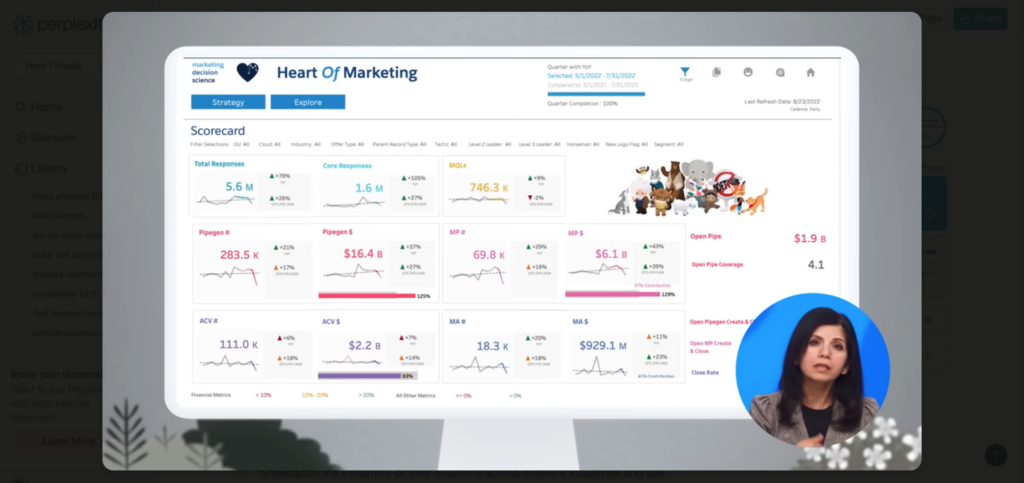
Salesforce also provides comprehensive video tutorials for users to learn how to use their CRM system 6. These step-by-step guides help customers maximise their Salesforce investment and showcase the platform's capabilities.
By creating diverse video series, Salesforce effectively demonstrates real-world applications of their products, provides social proof through customer testimonials, and educates users on maximising the value of their CRM investment.
The company also shows the versatility of their solutions across different industries and use cases and builds trust by being transparent about how it uses its own products.
4. SEO and organic traffic
- Provides high-intent users
- Offers cost-effective
- Boosts credibility and trust
By optimising your content for search engines, you can significantly enhance your visibility and attract high-quality organic traffic to your website. According to statistics, organic search drives 53% of all website traffic.
Optimising content for search engines involves various techniques and best practices designed to improve your website's ranking on search engine results pages (SERPs). This process includes keyword research, on-page SEO, technical SEO, and link building. The primary goal is to capture potential customers who are actively searching for solutions related to your products or services.
Unlike paid advertising, which stops delivering traffic once you stop paying, SEO can provide a steady stream of visitors over time. High-ranking content continues to attract clicks long after it is published.
Effective B2B SEO strategies:
- Keyword research: Focus on industry-specific and long-tail keywords that your target audience is likely to use. Tools like Google Keyword Planner and SEMrush can help identify these keywords.
- Content optimisation: Create high-quality, informative content that addresses your audience's pain points and questions. Ensure that your content is well-structured, with appropriate use of headings, meta descriptions, and alt text for images.
- Technical SEO: Ensure your website is fast, mobile-friendly, and easy for search engines to crawl and index. This includes optimising site speed, using HTTPS, and creating an XML sitemap.
- Link building: Develop a strategy to earn high-quality backlinks from reputable industry sources. This can involve guest blogging, partnerships, and creating shareable content.
- Local SEO: If you serve specific geographic areas, optimise for local search to attract nearby businesses. This includes creating and optimising a Google My Business profile and acquiring local citations.
Moz's SEO-focused blog consistently ranks for key industry terms, driving significant organic traffic and leads. Their comprehensive guides and resources on SEO best practices have established them as a thought leader in the industry.
The CRM giant Salesforce leverages SEO to rank for a wide range of business software-related terms, helping them maintain their industry-leading position. Their content strategy includes detailed blog posts, whitepapers, and case studies that attract and convert high-intent users.
AI can assist in generating first drafts, summarising documents, and optimising content for SEO. Tools like WriteSonic and Jasper can produce longer-form content quickly, while AI-powered analytics can help identify top-performing content types and topics.
Implementation tips:
- Conduct regular SEO audits: Identify and address technical issues that could be hindering your search performance. Tools like Google Search Console and Ahrefs can help with this.
- Create a content calendar: Align your content creation efforts with your keyword strategy. Plan and schedule content around high-priority keywords and topics.
- Monitor your search rankings: Use tools like SEMrush or Moz to track your search rankings and adjust your strategy based on performance.
- Optimise for featured snippets: Increase visibility in search results by optimising your content to appear in featured snippets. This often involves answering common questions directly and concisely.
- Leverage internal linking: Strategically linking to related content within your site will help search engines understand your site structure and improve user navigation.
By prioritising SEO and organic search in your B2B marketing strategy, you can attract more qualified leads, establish thought leadership, and drive sustainable business growth. Remember that SEO is an ongoing process, and consistent effort is key to long-term success.
5. Personalised content for different buyer personas
- Builds trust and authenticity
- Provides social proof
- Increases engagement and improves customer experience
Tailoring content to specific audience segments increases relevance and engagement by addressing different buyer personas' unique needs and pain points. Buyer personas are semi-fictional representations of your ideal customers, created based on real data and research.
These personas help marketers understand their target audience's demographics, psychographics, pain points, motivations, and buying behaviours of their target audience.
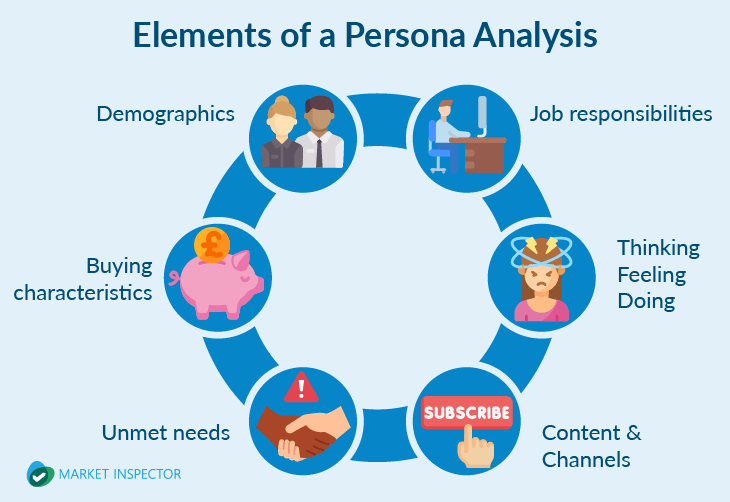
To effectively personalise content for different buyer personas, follow these steps:
- Identify your buyer personas: Create detailed ones based on real data and research. Use surveys, interviews, analytics, and CRM data to gather information about your audience. Aim to create 3-5 personas that cover the main segments of your target audience.
- Align content with buyer personas and buyer’s journey: Ensure that your content covers subjects that your personas care about and helps them solve their problems. Tailor your messaging to resonate with their challenges, goals, and interests at each stage of the buyer’s journey.
- Create accessible, engaging, and useful content: The format in which the content is delivered can be just as influential as the subject matter. Digitise your content to be visual, interactive, and experiential, leaving visitors feeling like they’ve had a two-way dialogue with your brand.
- Monitor and adjust based on performance: Use data analytics and marketing automation tools to gather insights about buyer behaviours, preferences, and interactions. Continuously optimise your personalisation strategies to ensure messages and content remain relevant and effective.
AI enables hyper-personalisation by continuously learning from customer interactions and data to deliver highly customised content and real-time experiences. This approach elevates customer engagement, strengthens relationships, and improves business outcomes by providing content and offers tailored to each customer's needs.
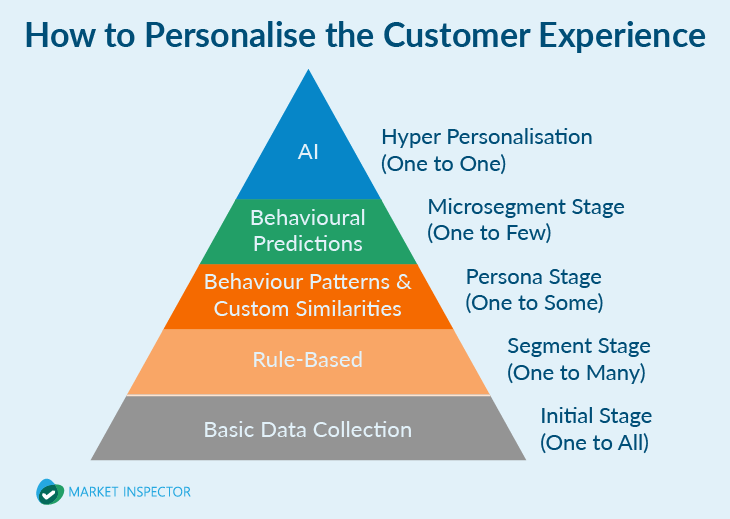
7. Strong email marketing strategy
- Provides direct communication with interested prospects
- Allows for segmentation and personalisation
- Can be automated for efficiency and consistency
Email marketing offers a direct line of communication with potential and existing customers, allowing businesses to nurture relationships, build brand awareness, and drive conversions.
Why email marketing is effective:
- High ROI and cost-effectiveness: According to a study by Litmus, for every £1 spent on email marketing, the average ROI is £32.76, which translates to a 4,200% return.
- Direct and personalised communication: Personalised email campaigns can improve click-through rates by 14% and conversion rates by 10%. Segmented email campaigns are even more powerful, with marketers who use segmentation seeing a 760% increase in revenue.
- High engagement rates: B2B emails have an average open rate of 15.14% and a click-through rate of 21%. These engagement metrics are higher than many other digital marketing channels, making email an effective way to capture and maintain the attention of your audience.
- Versatility and scalability: Email marketing can be used for various purposes, including newsletters, product announcements, event invitations, etc. It is also highly scalable, allowing businesses to reach a large audience with minimal effort.
- Measurable and optimisable: Email marketing provides detailed analytics, allowing marketers to track open rates, click-through rates, conversions, and more. This data can be used to continuously optimise campaigns for better performance.
For example, CB Insights' newsletter combines industry insights with a unique, engaging tone. This approach has helped them grow their subscriber base to over 500,000 and establish themselves as a trusted source of business intelligence.
It offers a succinct, 5-minute rundown on tech markets, money, and trends, delivered four times a week. The newsletter combines humour with serious B2B tech and investment insights, making it both informative and enjoyable to read. This unique blend has helped CB Insights differentiate itself from other data providers.
As of the latest reports, they are approaching one million email subscribers, with their flagship newsletter alone reaching over 750,000 subscribers. Additionally, niche newsletters on specific topics like digital health, consumer retail, and financial services collectively engage around 150,000 subscribers.
8. Creating and sharing case studies
- Provides concrete examples of product/service effectiveness
- Builds credibility and trust with potential clients
- Helps prospects visualise how the solution could work for them
Case studies showcase real results achieved by actual customers, building trust and credibility with prospects. 69% of B2B marketers consider them the most effective content type. They illustrate how your product/service solves specific challenges, helping potential customers envision how you could help them.
Case studies provide in-depth information about implementation, results, and ROI that other content formats can't match. According to statistics, 78% of B2B buyers use case studies when researching purchases as they give prospects concrete evidence to justify purchasing decisions to stakeholders.
Case studies can be repurposed into various formats like blog posts, videos, infographics, and sales collateral.
For example, FedEx utilised Adobe Analytics to track customer interactions across various touchpoints. This data helped them understand customer needs and preferences, allowing for more targeted and personalised communication.
"The opportunity to partner with Adobe is another step forward in the FedEx journey to create an open, collaborative e-commerce ecosystem that will help brands and merchants deliver seamless experiences for their customers,” said Raj Subramaniam, president and chief operating officer at FedEx. “With Adobe’s leadership in customer experiences, the ShopRunner platform and our global digital and logistics intelligence, we can increase the competitiveness of brands and merchants and create new possibilities in e-commerce."
9. Leveraging user-generated content
- Builds trust and authenticity
- Provides social proof
- Increases engagement
B2B marketers are increasingly leveraging the power of user-generated content (UGC) to build trust and authenticity that branded content often struggles to achieve. This shift is driven by consumers, including B2B buyers, placing a higher value on organic content created by their peers.
Statistics illustrate this point: 92% of consumers trust UGC more than traditional advertising, and B2B buyers find peer reviews 200% more trustworthy than brand-created content.
Beyond trust, UGC fosters social proof, increases engagement by tapping into customer networks, and allows for cost-effective content creation. Furthermore, UGC campaigns can expand reach by leveraging established customer networks.
IBM's #IBMCodeChallenge encourages developers to share projects using IBM technology, showcasing real-world applications and building community engagement. Its Call for Code global challenge encourages innovators across the globe to develop AI-powered solutions that address sustainability in endeavours to fight climate change.

For instance, Persistent's Synergy Squad, an independent software vendor/startup team, took home the 2023 Call for Code Global Challenge's Independent Software Vendor/Startup award.
Their solution, Offshelf, leverages IBM Watson Speech to Text technology to tackle household food waste. Offshelf helps families avoid food spoilage by sending timely notifications about product expiry dates, ensuring food items are used before they go bad.
Remember: despite technological advancements, the human element remains crucial in content marketing. Therefore, creating content that includes emotional touchpoints can help in building stronger relationships with business customers.
10. Hosting webinars and virtual events
- Provides in-depth education and thought leadership
- Allows direct interaction with the audience
- Generates high-quality leads
Webinars and virtual events have become a cornerstone strategy for B2B marketers. 73% of B2B marketers find webinars the best way to generate leads, and 91% of B2B professionals prefer them as a content format.
Their effectiveness lies in their ability to provide in-depth education and establish thought leadership, fostering direct interaction with the audience.
This engagement generates high-quality leads and proves to be a cost-effective alternative compared to traditional in-person events. Additionally, the scalability and global reach offered by virtual events are unmatched.
Conversion rates are impressive, too, with 20-40% of webinar attendees turning into qualified leads.
HubSpot's INBOUND conference, originally an in-person event, successfully transitioned to a virtual format, attracting over 70,000 attendees in 2020.
Based on HubSpot's example, here are the key technical components of a successful visual event campaign:
- High-quality video streaming: Make sure to use Content Delivery Networks (CDNs) for efficient global distribution, adaptive bitrate streaming to accommodate varying internet speeds, and live and on-demand video capabilities.
- Various interactive features: To engage attendees, incorporate live chat functionality for Q&A sessions and networking, polling and survey tools for real-time audience feedback, and virtual "rooms" for breakout sessions and workshops.
- User-friendly interface: This will help attendees to navigate between different sessions, create personalised schedules, and access resources and downloadable materials.
- Networking capabilities: Include AI-powered matchmaking algorithms for suggestions connections, group discussion forums, or "lounges" for topic-based networking.
- A robust CMS: This is needed to provide on-demand access to recorded sessions or organise and schedule all conference sessions
- Analytics and tracking: This is important to track attendee engagement and participation, gather data on popular sessions and topics or provide insights for future event planning.
Podcasts are gaining traction as a medium for B2B marketing. They provide a platform for thought leadership and can help in building authority and trust among professional audiences.
AI can generate summaries and key takeaways from webinars, making it easier to repurpose content. Use AI to send personalised follow-up emails and content recommendations based on webinar engagement.
Consistency, personalisation, and a focus on delivering actionable insights are key to building trust and fostering long-term relationships with your audience. Additionally, leveraging interactive content and optimising for search engines can significantly enhance the content's reach and effectiveness.
The journey to mastering B2B content marketing is ongoing. Continuously monitor industry trends, experiment with new tactics, and refine your strategies based on performance data and audience feedback. This will ensure that your content marketing efforts remain relevant, impactful, and aligned with your business goals.
B2B content marketing is not just a tactic but a strategic imperative that can transform your brand's presence and influence in the market. By implementing these strategies, you can unlock the full potential of content marketing, driving meaningful engagement, generating high-quality leads, and ultimately achieving sustained business success in the digital age.

Anna is a Digital PR and SEO Copywriter at Market Inspector, bringing over 5 years of experience to the B2B content marketing landscape. Skilled in crafting compelling website copy, blog posts, and press releases, she excels at building high-quality backlinks and driving organic traffic.
Anna’s background in communication marketing equips her with a deep understanding of audience needs and the ability to tailor content for maximum impact. She thrives on collaborating with industry experts to create informative and engaging content that resonates with target decision-makers.
We strive to connect our customers with the right product and supplier. Would you like to be part of Market Inspector?

